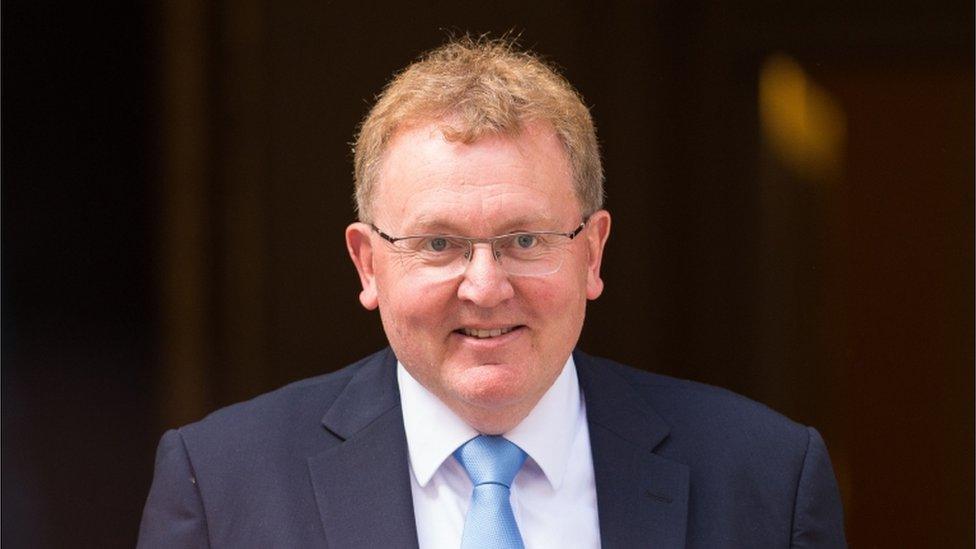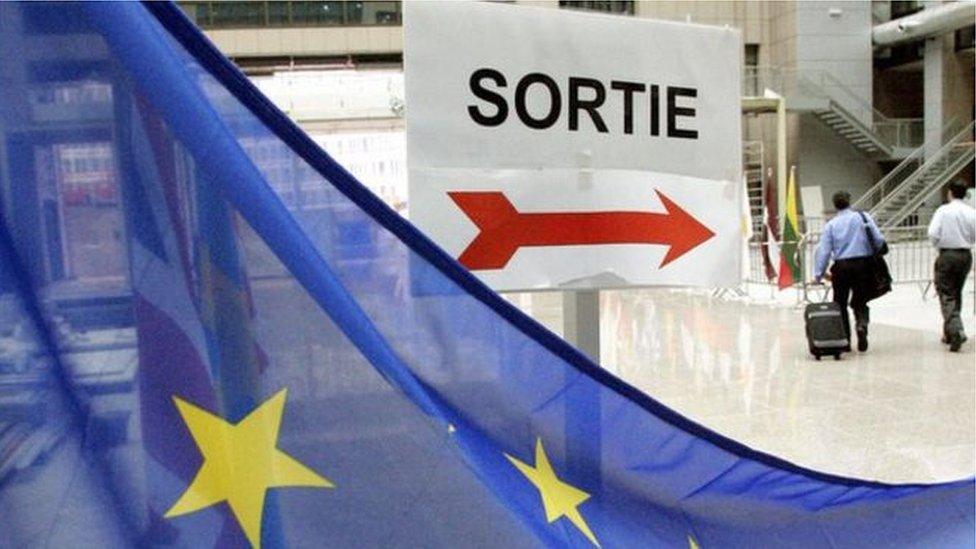David Mundell: 'Strong argument' for EU vote in June
- Published

Mr Mundell said he wanted the UK to remain a part of the EU
A UK cabinet minister has said there is a "no argument" against holding a referendum on the country's EU membership in June.
Scottish Secretary David Mundell said the timescale would be sufficient for people to weigh up the issues.
He argued that it would be possible to have an EU vote just a month after May's Scottish Parliament election.
But he stressed that the timing would depend on successful renegotiation of the UK's EU membership.
Last week, Scottish First Minister Nicola Sturgeon said she was concerned that a June vote on the EU would leave too little time for the issues to be properly aired.
She also warned Prime Minister David Cameron that a "narrow" focus on the renegotiation of UK membership risked allowing the campaign for Brexit to "steal a march".
Insisting that this was not the case, Mr Mundell said: "The position with the EU referendum is obviously there are a number of people who have very fixed positions.
"In that way it's similar to the referendum in Scotland - some people who are 'out' whatever, some people who are 'in' whatever, some people who want to hear the arguments.
"I think the experience that we can bring for Scotland is spending two years on a referendum, it is an inordinate length of time.
"I think most people in this room and in their own experiences would realise that actually most people engaged with the referendum really in those final four or six weeks of it when it was imminent."

Analysis by Brian Taylor, BBC Scotland political editor
Fancy a dual democratic exercise? That may well be coming your way as it looks increasingly likely that the referendum on EU membership will be held in June, not long after the Holyrood elections in May.
Chatting to folk who need to know these things produced the verdict that such an outcome was now "probable", rather than possible.
Plus of course we now have the Secretary of State, David Mundell, saying that there are good reasons for a June electoral test - and, in his view, no germane counter opinions.
A bit more on that emerged from a political debate I chaired at Dundee University last night, hosted by the Students Association.
We had four leaders - Nicola Sturgeon, Kezia Dugdale, Willie Rennie and Patrick Harvie. The role of Ruth Davidson was ably portrayed by Alex Johnstone MSP.
Mr Johnstone suggested that it was vital to hold the EU ballot in June. His argument was that any deal which emerges from EU negotiations in February needs to be banked immediately via a plebiscite. Otherwise it would risk breaking apart.

Mr Mundell said "all the indications" pointed to Prime Minister David Cameron being able to successfully renegotiate the UK's membership of the EU.
And he said he would be campaigning for the UK to stay in the EU on that basis.
He added: "So, I think that there isn't an argument against having the referendum in June, I think in fact there is a strong argument to have it then, subject to obviously there being the necessary agreement."
Responding to Mr Mundell's comments, the Scottish government's Europe minister Humza Yousaf said: "David Cameron's ill-thought-through referendum plans risk dragging Scotland out of Europe against our will - and it's vitally important that there is as much scrutiny of the campaigns as possible in advance of the vote.
"Both the Scottish Parliament elections and the EU referendum are vitally important events for Scotland - and neither campaign should be drowned out by the other.
"As the first minister made clear last week, a June referendum restricts the opportunity to make the case for remaining in the EU and shows disrespect to the elections taking place in Scotland, Wales and London in May."

David Cameron hopes that a renegotiation of the UK's membership of the EU will be enough to avoid a so-called Brexit
Mr Mundell also predicted that the Scottish Conservatives could overtake Scottish Labour to become the second party at Holyrood.
And he called for a "reboot" of the relationship between Holyrood and Westminster, and said there should be an end to the "petty politicking and sniping" between the Scottish and UK governments after the Scottish elections in May.
He cited the "extensive and collegiate" inter-governmental work carried out on issues such as the Forth Road Bridge closure and the response to the falling oil price.
He added: "All this goes to show that we can and do work well together, but why can't this be the norm for all our interactions?
"The problem is this positive work behind the scenes is not what gets the coverage. What does are the spats and fall-outs."
The SNP said Mr Mundell should match his "warm words" with real action, and that it was looking for real evidence of the UK government's willingness to cooperate.
- Published19 January 2016